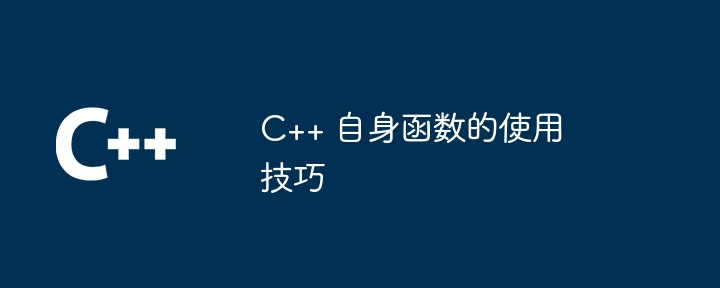++ 自身函数是指 c++ 中提供的实用函数,用于简化和优化代码。这些函数包括:sort():对容器进行排序。max() 和 min():比较两个值并返回较大(或较小)的值。find():在容器中查找特定元素。erase():从容器中删除特定元素。transform():将一种容器中的元素转换为另一种类型的容器中的元素。

C++ 自身函数的使用技巧
C++ 自身函数是指那些定义在 C++ 标准库中的实用函数,它们可以简化和优化代码。以下是一些常见的 C++ 自身函数及其使用技巧:
1. sort() 函数
立即学习“”;
#include <algorithm> std::vector<int> nums = {5, 2, 7, 3, 1}; std::sort(nums.begin(), nums.end());
登录后复制
实战案例:对给定整数数组进行排序。
2. max() 和 min() 函数
#include <algorithm> int a = 5; int b = 3; std::cout << std::max(a, b) << std::endl; // 输出: 5 std::cout << std::min(a, b) << std::endl; // 输出: 3
登录后复制
实战案例:比较两个值并返回较大(或较小)的值。
3. find() 函数
#include <algorithm> std::vector<int> nums = {1, 2, 3, 4, 5}; auto result = std::find(nums.begin(), nums.end(), 3); if (result != nums.end()) { std::cout << "找到元素 3" << std::endl; }
登录后复制
实战案例:在一个容器中查找特定元素。
4. erase() 函数
#include <algorithm> std::vector<int> nums = {1, 2, 3, 4, 5}; auto result = std::find(nums.begin(), nums.end(), 3); if (result != nums.end()) { nums.erase(result); // 删除找到的元素 }
登录后复制
实战案例:从容器中删除特定元素。
5. transform() 函数
#include <algorithm> std::vector<int> nums = {1, 2, 3, 4, 5}; std::vector<double> doubles(nums.size()); std::transform(nums.begin(), nums.end(), doubles.begin(), [](int n) { return static_cast<double>(n); });
登录后复制
实战案例:将一种容器中的元素转换为另一种类型的容器中的元素。
这些只是 C++ 自身函数的几个常见示例。通过熟练掌握这些函数,您可以编写更简洁、更高效的 C++ 代码。
以上就是C++ 自身函数的使用技巧的详细内容,更多请关注php中文网其它相关文章!
 微信扫一扫打赏
微信扫一扫打赏
 支付宝扫一扫打赏
支付宝扫一扫打赏

